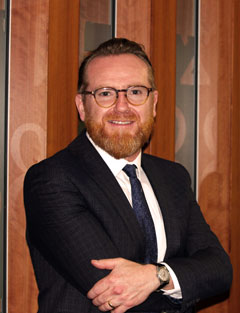January 27, 2020
Q&A with Fulbright scholar Jon Adams
Submitted by Communications and Marketing

As part of the national Fulbright Scholar Program, K-State's Oz to Oz Fulbright Scholars Seminar brings senior research scholars to campus to build and develop international partnerships and friendships.
Free and open to the public, Jon Adams, distinguished professor of public health at the University of Technology Sydney, will present "Challenges & Opportunities of Complementary and Integrative Medicine Use for Chronic Illness in Vulnerable Communities: Informing Implementation" as part of the Oz to Oz Fulbright Scholars Seminar at 4 p.m Tuesday, Jan. 28, in 164 Justin Hall.
This Q&A gives the university community an opportunity to learn more about the scholar speaker and reinforces the importance of mutual understanding and education of diverse research topics.
What is your field of study?
I have broad public and global health and primary health care interests but my main focus over the last 20 plus years has been examining complementary and integrative health care — including such practices as acupuncture, naturopathy, herbal medicines, yoga and meditation — and community-based, self-care particularly with regards to aging, chronic illness and vulnerable/marginalized communities. Most of my work to date has focused upon the behaviors, decision-making, access, communication and (non)disclosure between patients and providers around these health care practices.
How is the Fulbright scholarship helping you increase knowledge of this area?
My Fulbright Senior Scholarship is the first ever to exclusively focus upon integrative medicine practice and provision for vulnerable communities and their needs. While there are numerous pockets of interest in this topic in the U.S. and elsewhere, the focus has tended to be upon the clinical issues and perspectives driving such practice and provision. My Fulbright work will provide the first in-depth research perspective on this topic drawing heavily upon health social science, cultural methods and the exploration of implementation and translation insights. Ultimately, the Fulbright Scholarship will help identify a road map toward transdisciplinary scholarship and practice with which policymakers, providers, health care managers and patients themselves can move toward more fully integrated, patient-centered care that can align with their health and cultural needs.
What drives your interest in your research?
Practices that are now commonly known as complementary and/or integrative health care remain extremely popular and no single medical knowledge system has a monopoly on healing in any culture. As such, it is essential that public health and health research more generally subject these practices, their use and a vast range of related issues to critical rigorous scientific examination. I am driven by this need and the significance of opening up scientific investigation to look at broader issues beyond simply efficacy. While the focus upon the efficacy of these medicines and practices is extremely important, it has often been at the expense of considering equally pressing but broader research questions relating to the political, economic, social and cultural. Indeed, my latest published book, Adams et al. (2019) "Public Health and Health Services Research in Traditional, Complementary and Integrative Health Care: International Perspectives" by World Scientific Publishing outlines the first strong public health agenda for ensuring such health care practices and seeking is a core component of mainstream global and public health thinking and scholarship.
Since the Fulbright helps to build collaborative relationships, in what areas do you want to collaborate with American researchers?
I am seeking to learn as much as possible while on my U.S. visit with regards to how patients and communities here interact with and utilize different medicines and health care practices and the role of different providers — both within and outside the dominant medical profession — in such concurrent use. I'm keen to connect with U.S. academics and practitioners from any discipline and with regard to any aspect of complementary and integrative health care; this reflects my inclusive, transdisciplinary approach to scholarship.
Why did you accept the invitation to visit K-State?
Amongst many other areas, I am aware that K-State has a focus upon and has developed outreach initiatives regarding health care for rural and remote patients and communities and I am excited to find out more from colleagues at K-State about such work. This will feed well into my Fulbright insights and experience, complementing the urban-focused collaborations I am undertaking at my Host Institution, Boston Medical Center, Boston University, Massachusetts. In addition, it will also be my first ever time in Kansas and I'm looking forward to finding out as much as possible about local culture and people during my short stay.
Adams will be on the Manhattan campus from Monday, Jan 27, to Thursday, Jan 30. Gwen Ferdinand-Jacob, physician assistant program, is his K-State host. During his visit, Adams will speak with Eric Atkinson, host of Agriculture Today. That interview, as well as all other Fulbright scholar interviews, are posted on the K-State Research and Extension News page.
